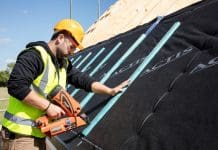 A new brick constructed using 3D printing and made from domestic plastic waste has been proven to provide 10 times better insulation than traditional bricks
A new brick constructed using 3D printing and made from domestic plastic waste has been proven to provide 10 times better insulation than traditional bricks
Researchers at De Montfort University Leicester (DMU) have created the new brick using 3D printing and lattice architecture technologies, which involves crisscrossing strips of the plastic materials to form a grid or weave.
Dr Karthikeyan Kandan, senior lecturer in mechanical engineering at De Montfort University Leicester (DMU), created the bricks from upcycled plastic waste.
The design is inspired by nature after Dr Kandan examined the structure of the Baya weaver bird’s nest; famous for its elaborately woven construction.
Experiments on the plastic waste brick
First-year PhD student at DMU, Saad Alqahtani, carried out controlled experiments on the plastic waste bricks, under joint supervision from Dr Kandan and Dr Farukh – also a senior lecturer in mechanical engineering at the university.
To test its thermal insulation characteristics, Saad placed the brick in a hot-box calorimeter – a piece of equipment used to measure the U-value of an object, which can be set up to simulate the regulatory standard for buildings.
The results showed the new design delivered an impressive U-value of 0.25 Watts per Metre Kelvin (W/m²K). This is 10 times more effective than a clay brick, which delivers an average of 2.94 W/m²K.
Traditionally, a range of building blocks are required to achieve the regulatory standard U-value, however, the newly designed plastic brick can achieve this on its own.
Dr Kandan said: “Our brick, made from all kinds of domestic plastic waste – from coffee cup lids to plastic bottles – exhibits a tremendous thermal envelope over conventional building materials.
“This provides significant potential to not only improve the energy efficiency of modern building, but also to conserve space and reduce dead-weight in multi-story buildings.”
Saad, who received a PhD scholarship from DMU to complete this work with Dr Kandan and Dr Farukh, said their brick could lead to a new era of energy-efficient construction while tackling the issue of plastic pollution at the same time.
Dr Kandan added: “It is fantastic to see one of our own PhD students taking the lead on this project and sharing our results on an international platform.
“There is a constant drive for energy efficient building materials so it is very exciting to know that our brick can outperform the thermal insulation of standard building materials by an order of magnitude.”
Other brick innovations
PBC Today has reported a range of brick innovations in the past, these include:
- The world’s first bio-brick grown from human urine has been unveiled by researchers at the University of Cape Town (UCT).
- A team at RMIT University in Melbourne demonstrated that fired-clay bricks incorporating biosolids could be a sustainable solution for both wastewater treatment and brickmaking industries.













